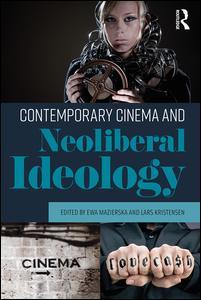Contemporary Cinema and Neoliberal Ideology
Coordonnateurs : Mazierska Ewa, Kristensen Lars

In this edited collection, an international ensemble of scholars examine what contemporary cinema tells us about neoliberal capitalism and cinema, exploring whether filmmakers are able to imagine progressive alternatives under capitalist conditions. Individual contributions discuss filmmaking practices, film distribution, textual characteristics and the reception of films made in different parts of the world. They engage with topics such as class struggle, debt, multiculturalism and the effect of neoliberalism on love and sexual behaviour. Written in accessible, jargon-free language, Contemporary Cinema and Neoliberal Ideology is an essential text for those interested in political filmmaking and the political meanings of films.
Introduction
Part I: Contemporary modes of production
1. Socialist Filmmaking or a Question of Leadership?: The working methods of Ken Loach
David Archibald (University of Glasgow)
2. American Independent Cinema and the Capitalist Mode of Production: Complicating Narratives of Subversion and Transgression
Kevan A. Feshami (University of Colorado Boulder)
3. Crowdfunded, or just crowded? The independent film market in the age of the Internet.
William Brown (University of Roehampton)
4. Mode of Production as a Political Statement: Veiko Õunpuu’s Films and Methods
Eva Näripea (Estonian Academy of Arts)
5. When Cinephilia Returned to Russia: Marxist cinema responds to Neo-liberal Capitalism.
Lars Kristensen (University of Skövde)
6. Uncranking the System: Ceicine and the Case of Adirley Queirós’s White Out, Black Stay (2014)
Alfredo Suppia (State University of Campinas)
Part II: Class relations, crisis and debt
7. Joanna Hogg: Bourgeois Social Realism and the Enduring Significance of Capitalism and Class
Paul Dave (University of Teesside)
8. The Rise of the Entrepreneur: Jia Zhangke’s Words of a Journey
Corey K.N. Schultz (University of Southampton)
9. The representation of class in recent Greek cinema
Rosa Barotsi (ICI Berlin)
10. Neoliberal Crisis, Debt and European Cinema
Ewa Mazierska (University of Central Lancashire)
11. Representation of Class Struggle in Contemporary American Cinema, or ‘Socialism for Dummies’
Doru Pop (Babeș-Bolyai University, Cluj)
Part III: Capitalism, Love and Sex
12. ’Boy-Image Meets Girl-Image and Consummates Image-Romance’: Shulamith Firestone’s "The Dialectic of Sex, The Cultural Contradictions of Capitalism and Romantic Comedies.
Anna Backman Rogers (University of Gothenburg)
13. Love can save the day: charting two decades of love and sex within capitalism as seen through the cinematic lens of Bret Easton Ellis
Kamila Rymajdo (Kingston University)
14. Queering Bakhtin: Sexual Carnival and Class Struggle in Eytan Fox’s The Bubble
Bruce Williams (William Paterson University of New Jersey)
Ewa Mazierska is Professor of Film Studies at the School of Humanities and Social Sciences at the University of Central Lancashire. She published over twenty monographs and edited collections on film and popular music. Mazierska (with Kristensen) has also organised two conferences entitled 'Marx at the Movies', once in 2012 and again in 2015, which were devoted to the interface between the moving image and Marxism.
Lars Kristensen is Senior Lecturer in Media Arts, Aesthetics and Narration at the University of Skövde, Sweden, where he teaches moving image theory to game developers. His research focuses on Russian and Eastern European filmmaking as well as bicycle cinema, post-critique and theories of game and play. His publications have appeared in Studies in Eastern European Cinema, Games and Culture, Journal of Gaming and Virtual Worlds and Thesis Eleven.
Date de parution : 10-2017
15.6x23.4 cm
Date de parution : 10-2017
15.6x23.4 cm
Thèmes de Contemporary Cinema and Neoliberal Ideology :
Mots-clés :
Ewa Mazierska; contemporary cinema; Ae Fond Kiss; capitalism; Exotic Marigold Hotel; socialism; Female Sex Tourism; Younger Man; Lars Kristensen; Laurent Cantet; filmmaking; Big Fat Greek Wedding; Marxist cinema; Vice Versa; neo-liberalism; Chick Flick; politics; Wang Keqin; political economy; Jia Zhangke; David Archibald; Motti Regev; Kevan Feshami; Screen Grab; William Brown; Contemporary Romantic Comedy; Harmonious Society; Corey Kai Nelson Schultz; Erotic Capital; Paul Dave; Loach’s Work; Rosa Barotsi; Eyed Monsters; Doru Pop; DVD Box Set; Constantin Parvulescu; Rogue Trader; Elżbieta Ostrowska; Romantic Comedy; Kamila Rymajdo; Independent Cinema; Martin O'Shaughnessy; American Psycho; Bruce Williams; Pan Shiyi; American Independent Cinema



